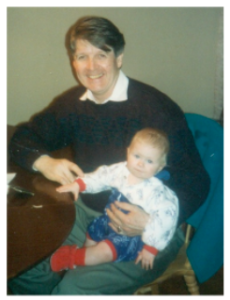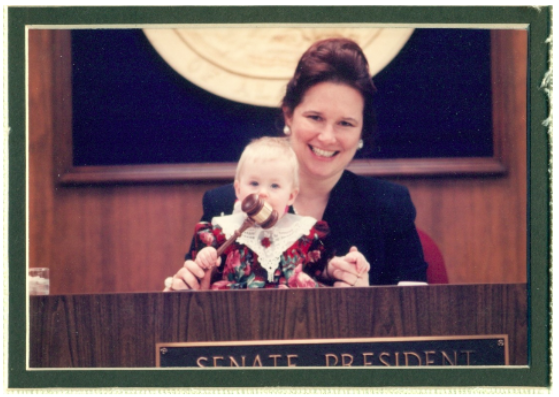(Part II: Drue Pearce, who was incoming Alaska Senate President in November of 1994, and her husband Michael Williams had arrived in Yakutsk, Russia to bring their adopted baby home to Alaska. But as they were leaving the country, the Duma passed a law forbidding adoptions to other countries. How would they bring Tate Hanna home?)
By DRUE PEARCE
FORMER ALASKA SENATE PRESIDENT
We quickly realized that my new role as incoming Senate president was going to change everything for us. We had been traveling for more than 24 hours, but the leaders in Yakutsk were not going to let us go without dinner and vodka.
As tired as we were, it was still a wonderful dinner. I sat next to a petite woman in a green fur coat that reached the ground, whose head was covered by a matching fur hat. Olga was delightful and helpful, and as the person in charge of the Yakutsk orphanages, she explained that Irina and the driver would bring baby Tate and the retired nurse caregiver to our hotel the following morning.
The evening came to a close at last. Totally bewildered by events and delirious with exhaustion, Michael and I retired to our room, where we looked at each other, laughed, and fell fast asleep.
In the morning, we had the briefest of visits with Tate and her caretaker, who was very protective. The week passed quickly. There were visits to the various orphanages, where to this day I wish we had been able to adopt some of the older children. Their eyes said it all. “Please take me back with you.” But we did not see our baby Tate again until the day before we were to leave, although we asked time and time again.

WHAT THE SHAMAN SAID
Olga took us to visit the local shaman. We were surprised to see Tate there, along with her nurse.
The Native people of Sakha have strong attachments to their traditional religions and we knew Tate was part Native. The shaman explained how the earth and horses are intertwined for the benefit of the peoples of the north.
He blessed the little girl and told us that she would be “as one with the horse.” She was given a dream catcher talisman and other symbolic items, all made out of horsehair. Later, we would view it as prophetic, as Tate has become a highly capable horsewoman and trainer.

I had been asked to speak at a conference on education the following morning. No sooner had I started my speech, than Olga called me off the stage and Michael and I were bundled into an awaiting car. We travelled at great speed to the main government building, where we were told that we were to get on the next plane to Moscow.
The Russian Duma was about to pass a bill banning foreign adoptions.
Document after document was thrust in front of us for our signatures. With the formalities completed, we were driven back to the hotel where the nurse was waiting with Tate. Then it was out to the airport. The plane was sitting on the runway, the passengers lined up 50 yards away, waiting to board – if and when the mechanical issues were resolved. The temperature hovered around -60.
Finally, we boarded and headed for Moscow.
THE DUMA THREATENS
The following day we ran into another snafu with the U.S. State Department. The documents issued to Tate in Yakutsk had a black-and-white photograph of the child, not acceptable to the State Department. We explained that there had been nowhere in Yakutsk where a color photograph could have been be taken, but the officials were not swayed.
Finding a place to get a color photograph in Moscow was not that simple, but by the following day, we had scrambled to meet the requirement and were confirmed on the next flight out.
That final night at our hotel was one of joy and worry. The joy was when I took Tate into the bath with me. I doubt she had ever seen water before. She was slow in her physical and motor skill development, unable to sit up on her own at seven months, but when she was held and hugged I knew this was the first time she had ever experienced such emotion and she didn’t want it to stop.
The television news bought the worry: The Duma had passed the law banning foreign adoptions. Strictly speaking Tate was already adopted, but in a country such as Russia, legalities mean very little when politics is afoot.
We would have to smuggle her out of the country.
The next morning, we headed to the airport, with Tate bundled in baby carrier tight against Michael’s chest, over which he wore his large Arctic parka. The parka had been essential wear in Yakutsk; it wasn’t that cold in Moscow, but it made an excellent cover. He looked like a portly man walking to the aircraft.
We breezed through the ticket and passport control, conveniently forgetting to show Tate’s passport. But as we walked toward the gate, we were met by a group of heavily armed border police, eyeing everyone.
My response in such situations has always been to march as authoritatively as possible toward them and hope they salute. We swept past and were soon aboard the Boeing 767 jet.
Being careful to conceal our 7-month-old daughter, as we took off our coats, we rolled Tate in Michael’s parka and pushed her under the seat in front of us. When flight attendant came to collect our coats, she reached for the parka, but I stopped her, whispering to her the details of the situation. She had been in Moscow a couple of days and knew what the Duma had done. And so the parka remained on the floor.
“You two need a drink,” she said. Two gin & tonics appeared, followed by two more.
Then it happened. Just as we were beginning to relax, a squad of border police boarded the jet. They were obviously looking for something or someone. As they passed, I pressed my feet on the little body hidden in the parka. She didn’t make a sound. We realized later that she must have learned at the orphanage that crying didn’t get any response so she just didn’t cry. The police came back down the aisle and again, not a sound from that wonderful child.
The airplane’s doors were finally shut and we pushed back from the gate. We left Tate at my feet until we were in the air because we were concerned we might have to return to the gate.
Paranoia? Probably, but we had the most precious cargo in the world, and were not willing to risk it.
As the plane climbed out of reach of the Russian border police, I reached down and picked Tate up, gave her a hug, and thanked her for being such a good girl.
At that moment, the senior flight attendant announced on the intercom that a new American was in Row Two, and that she was possibly the last adoption out of Russia for some time.
A loud cheer reverberated throughout the cabin. Tate was winging her way to the U.S.A., her new home.
